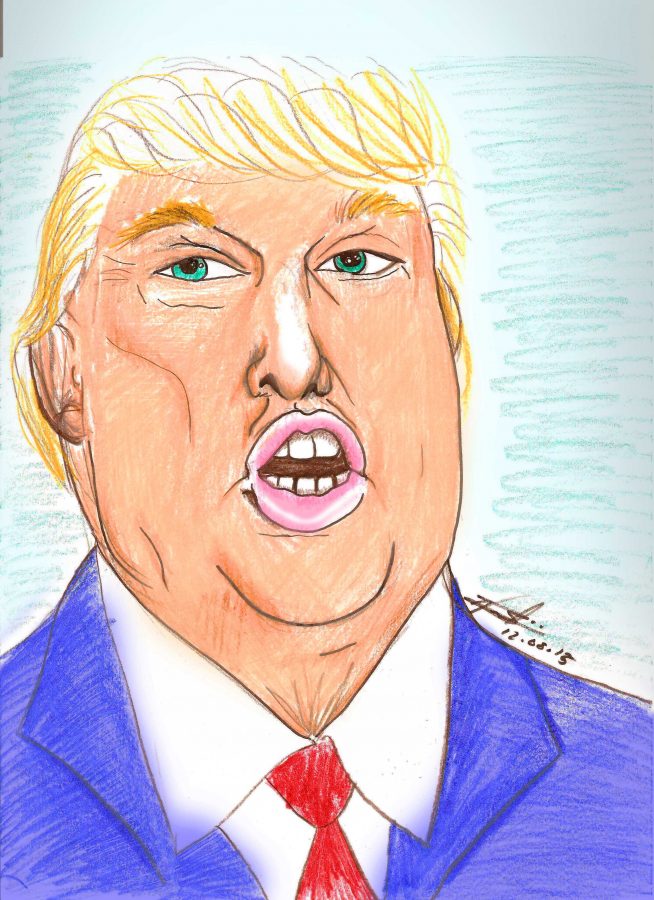Donald Trump is a man of many talents: His ability to self-promote is as large as his casinos, and his knowledge of bankruptcy is thorough after having filed for four of them.
And while Trump is putting these skills to use in his current foray into presidential politics, he’s also revealed a new area of talent — demagoguery. This means that whether he is only after a share of the spotlight or has deeper ambitions, he is going to continue to use antagonistic antics as means to his ends.
At a Nov. 21, rally in Alabama, Trump made some belligerent claims about Muslim Americans’ reactions to the 9/11 terrorist attacks.The Republican presidential candidate said that as he watched the World Trade Center fall from New Jersey, “thousands of people were cheering.”
Trump used a clip from the Washington Post to back up his statement. The clip said that law enforcement officials had detained individuals in Jersey City who had allegedly celebrated the attacks.
And while the media has pounced on Trump’s exaggeration — even Fox News’ Bill O’Reilly told Trump he was stretching the truth — trying to label Trump as a liar only plays into his hands. It supports the narrative of the stacked deck, and coverage bias, that the “liberal media” has piled against him and others on the right.
That’s because facts are not very important to Trump’s campaign. Currently, Politifact, the Pulitzer Prize-winning fact-checking organization, has yet to rate one of Trump’s 72 reviewed claims true.
These inaccuracies aren’t mistakes. Trump is not attempting to woo voters with even the illusion of reasoned solutions, like most mainstream American presidential candidates attempt to do.
The distinguishing feature of Ted Cruz’s campaign is his tax plan. For Martin O’Malley, it’s gun control. Jeb Bush has, “I’m related to two presidents.” For Trump, it’s his oppostion to immigration.
Trump is resolute in his commitment to that fact that Mexicans are “bringing drugs … bringing crime. They’re rapists.” The Chinese “come in … through the back door and totally take advantage of everyone,” like “they always do.” And, “It is obvious to anybody that the hatred [Muslims hold toward Americans] is beyond comprehension.”
This makes him much worse than a liar. He’s a demagogue, “a political leader who tries to get support by making false claims and promises and using arguments based on emotion rather than reason,” according to Merriam-Webster. He doesn’t make use of reason — he appeals to people’s deep-seated biases under his tough “tell it like it is” businessman persona.
The worst part is how appealing his candor can seem. At first, Trump seemed like he would be rough around the edges, but with a mixed record of partisanship, I figured he could make some good points and give Republicans a pugnacious moderate candidate.
But as I listened to his very first campaign speeches, I realized he would not be the answer to my radical center dreams.
As the New York Times noted in its analysis of 950,000 of his words, Trump’s rhetoric is filled with us-versus-them examples, usually placing white, middle-class Americans against perceived outsiders to their culture, such as Muslims or Mexicans. He also takes care to rarely attack his fellow candidates’ ideas, instead focusing on their persons. “Stupid,” “horrible” and “weak” are great words to rile up a crowd, but would get you a “C” on any real analysis of policy.
O’Reilly — the great bastion of arrogant conservatism — even called out Trump’s imprecise word choice.
“Here’s what happens,” O’Reilly said. “Sometimes, when you’re up there, you get overly excited and you’re speaking extemporaneously. And then you say things, as anybody would, because the crowd is cheering and everything is going wild, that you don’t know to be true but you believe to be true.”
In response, Trump defended his bigoted remarks as one of the symptoms of refusing to use a teleprompter.
“You don’t get the same excitement, you don’t get the same feeling,” Trump said of using a teleprompter. “And I haven’t made very many mistakes.”
Trump’s remarks couldn’t be any worse than if he displayed them on a karaoke board for all his supporters to sing aloud to the tune of “Deutschland uber alles.”
Sure, from Pat Robertson to Pitt’s own Rick Santorum, plenty of fringe candidates have led early in the Republican primaries and later petered out, as FiveThirtyEight, the data journalism website, details. But it is worrisome that a full 36 percent of Republicans — from CNN’s latest national poll — support Trump, the man whose campaign has been more about bigotry and insults than serious policy.
I’m hoping Trump hits a wall — one made entirely of hubris — but we must remain vigilant until then. The circular logic of his supporters makes disproving his words themselves pointless.
While Trump gained his spotlight trying to find an apprentice, his rhetoric has proven himself an acolyte of Huey Long and Joseph McCarthy.
Call the spade a spade — Trump is the next All-American demagogue.
Stephen Caruso is a senior columnist at The Pitt News. He mainly writes on economic and social issues. He is also the production manager.
Email Stephen at [email protected].



